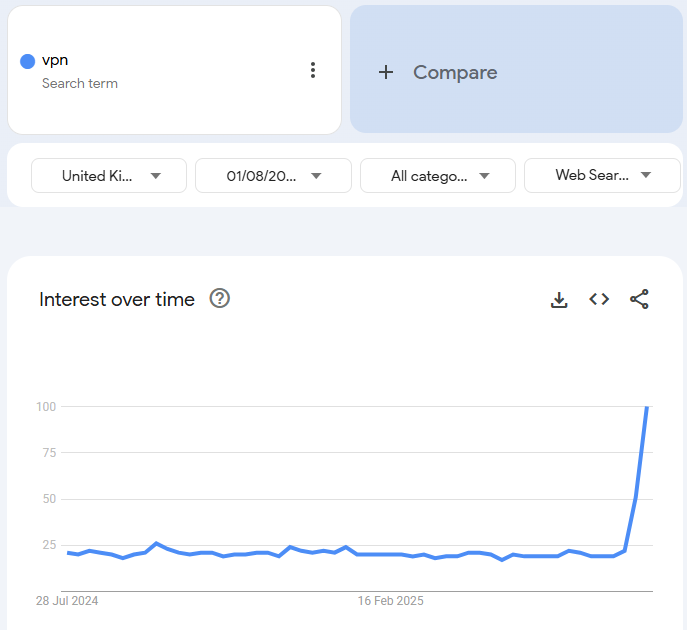TLDR; what this article covers:
- New UK age verification laws could lead to a spike in VPN usage as users look to bypass ID checks.
- Marketing tools like Google Analytics, Search Console, HubSpot, and Mailchimp may start showing skewed location data.
- Expect UK traffic to appear as international, making it harder to segment and report accurately.
- This shift could impact SEO, PPC targeting, audience segmentation, and reporting reliability.
- Learn how to spot the signs, adjust your reporting mindset, and manage client expectations before data confusion sets in.
Age Verification Laws
A significant shift is underway in the UK that will have a substantial impact on how we track and measure digital marketing performance, and it all hinges on age verification laws.
Simply put, new UK regulations have been introduced that require websites with adult or age-sensitive content to verify that users are old enough to view it. This means uploading a photo ID, using Face ID, or linking to official records.
While age verification laws might sound like a good move to protect younger users online, it comes with a knock-on effect that a lot of marketers and business owners need to be aware of, which they may not have considered. Unfortunately, your reporting data (such as Google Analytics), which you use to interpret user behaviour and make decisions, may become unreliable and difficult to segment by country.

People Don’t Want to Upload Their ID to Verify Their Age – So They’ll Use VPNs
Let’s be honest: most people won’t want to scan their passport or give a selfie just to watch a video or read a forum thread. That’s where VPNs (Virtual Private Networks) come in.
VPNs let users browse the internet as if they were in another country. It’s a way of bypassing restrictions, avoiding tracking, or, in this case, avoiding annoying age verification pop-ups.
And while VPNs aren’t new, these new laws are likely to drive increased usage, especially among younger users who are more tech-savvy. What that means for you, as a marketer or website owner, is that your traffic data might start telling you that more users are from the USA, Germany, or Japan, when in reality, they’re sitting in Leeds or London.
We used Google Trends to determine the number of people searching for “VPN” related keywords in the UK, and the data confirmed our suspicions. This screenshot shows the number of searches that included “VPN” over the past 12 months:

The obvious spike in interest in “VPN” searches over time correlates with the age verification laws coming into play in the UK.
What Age Verification Laws and the Use of VPNs Mean for Google Analytics and Search Console
Tools like Google Analytics and Google Search Console rely on IP addresses and regional settings to figure out where your users are coming from. If more and more UK users start using VPNs to pretend they’re based elsewhere, your reports are going to get messy, fast.
You might notice things like:
- A sudden drop in UK traffic.
- An increase in international users (especially from countries popular in VPN defaults like the US or the Netherlands).
- Geo-targeted campaigns not performing as expected.
- Search impressions and rankings for UK-based queries fluctuating for no apparent reason.
This isn’t just a reporting issue though, as it can affect your actual marketing decisions. You might think your UK audience is shrinking, shift budget or content focus elsewhere, and completely misfire because the data doesn’t reflect the truth.
It Doesn’t Stop with Google
It’s not just Analytics and Search Console that will be affected by age verification laws. If you use tools like:
- HubSpot for lead tracking
- Mailchimp for campaign segmentation and email automation,
- Hotjar or Microsoft Clarity for user recordings and heatmaps…
…they’ll all be affected in similar ways. Location-based segments, behaviour tracking, and even A/B testing could start giving skewed results. For example, if a lead comes through claiming to be from Paris but they’re really in Portsmouth, your location-based workflows might send irrelevant content or assign the lead to the wrong sales rep.
What Can You Do About It?
Unfortunately, there’s no perfect solution. VPN traffic is hard to filter out completely, and most analytics tools aren’t built to identify when a user is spoofing their location.
However, here’s what you can do to improve your marketing decision-making as Users adopt VPNs:
- Look for patterns, not absolutes. Focus more on trends over time than specific geographic numbers.
- Be cautious with location-based decisions. Cross-reference with other sources, like CRM data, form submissions, or postcode data if you collect it.
- Set client expectations. If you’re an agency, let your clients know this shift is happening and that it may affect how accurate some data points are going forward.
- Use server-side or login-based analytics (where possible) for higher accuracy, especially if your site has gated content or user accounts.
Final Thoughts on Reporting as The Use of VPNs Increases
The change in age verification laws isn’t going to break the internet, but it is going to throw a spanner in the works when it comes to clear, accurate reporting. Especially if your business relies heavily on location-based digital marketing.
So, whether you’re running PPC campaigns, managing SEO, or building reports for yourself or your clients, keep this on your radar. The rise of VPN usage isn’t just a privacy story, it’s a digital marketing data story too.



